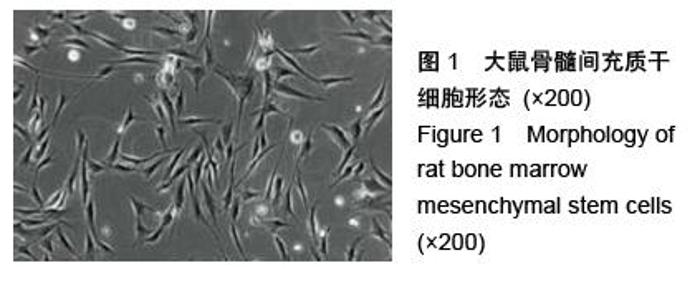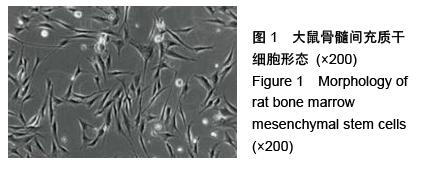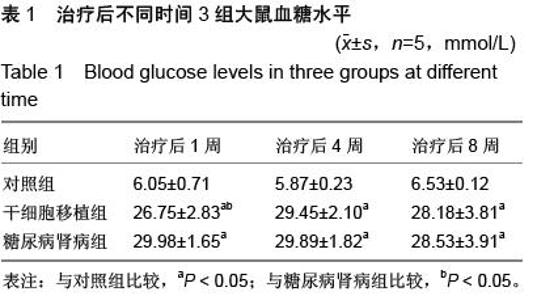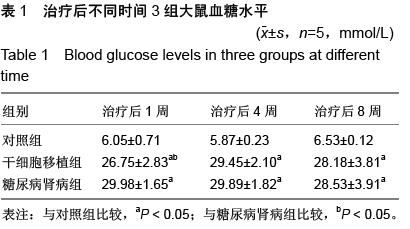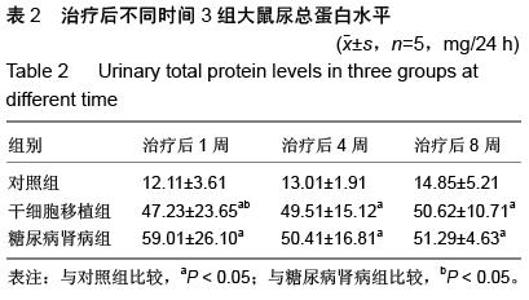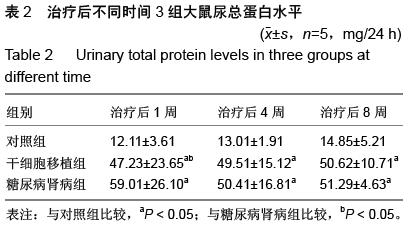| [1] 周虹,高赟,田浩明,等.骨髓间充质干细胞治疗大鼠糖尿病肾病初探[J].四川大学学报:医学版, 2009,40(6):1024- 1028.
[2] 何晏清,杨萍.干细胞移植治疗糖尿病肾病:可能可行与应用[J].中国组织工程研究,2014,18(10):1635-1640.
[3] 吕莎莎.骨髓间充质干细胞对糖尿病大鼠的肾脏保护作用及其相关机制研究[D].济南:山东大学,2014.
[4] François S, Bensidhoum M, Mouiseddine M, et al. Local irradiation not only induces homing of human mesenchymal stem cells at exposed sites but promotes their widespread engraftment to multiple organs: a study of their quantitative distribution after irradiation damage. Stem Cells. 2006;24(4):1020-1029.
[5] 张瑞,戴春.骨髓间充质干细胞对糖尿病肾病大鼠肾脏骨形态发生蛋白-7干预的研究[J].中华临床医师杂志:电子版,2013,7(15):7059-7063.
[6] 张翊.超声介导的微泡破坏促进MSCs归巢并修复糖尿病肾病的实验研究[D].重庆:第三军医大学,2013.
[7] Lv SS, Liu G, Wang JP, et al. Mesenchymal stem cells transplantation ameliorates glomerular injury in streptozotocin-induced diabetic nephropathy in rats via inhibiting macrophage infiltration. Int Immunopharmacol. 2013;17(2):275-282.
[8] 王帅.骨髓间充质干细胞对1型糖尿病肾病大鼠足细胞病的治疗及机制研究[D].重庆:第三军医大学,2012.
[9] 杨晓燕,潘兴华,阮光萍,等.干细胞移植治疗糖尿病肾病[J].中国组织工程研究,2013,17(1):150-155.
[10] Minsoo Noh,Soo Hwan Lee. 15-Hydroxyprostaglandin Dehydrogenase Is Associated with the Troglitazone- Induced Promotion of Adipocyte Differentiation in Human Bone Marrow Mesenchymal Stem Cells. Biomolecules & therapeutics. 2010;18(1):16-23.
[11] 张红岩,任野平,刘识鉴,等.骨髓间充质干细胞移植治疗糖尿病肾病的研究进展[J].临床内科杂志, 2014,31(9): 645-647.
[12] 黄盛.不同微环境对骨髓间充质干细胞分化为产胰岛素细胞的影响[D].西安:第四军医大学,2008.
[13] Lu D, Chen B, Liang Z, et al. Comparison of bone marrow mesenchymal stem cells with bone marrow-derived mononuclear cells for treatment of diabetic critical limb ischemia and foot ulcer: a double-blind, randomized, controlled trial. Diabetes Res Clin Pract. 2011;92(1):26-36.
[14] 齐文文,吕莎莎,柳刚,等.人脐带间充质干细胞共培养改善高糖诱导的足细胞凋亡[J].中华肾脏病杂志, 2014, 30(12):933-938.
[15] 赵红梅,胡祥,李芳,等.骨髓间充质干细胞在肾脏疾病中的应用[J].中国组织工程研究与临床康复, 2010,14(23): 4329-4332.
[16] Vériter S, Aouassar N, Adnet PY, et al. The impact of hyperglycemia and the presence of encapsulated islets on oxygenation within a bioartificial pancreas in the presence of mesenchymal stem cells in a diabetic Wistar rat model. Biomaterials. 2011;32(26):5945-5956.
[17] 许跃,顾志峰.间充质干细胞治疗1型糖尿病及其并发症的研究进展[J].交通医学,2011,25(3):220-223.
[18] 张健,赵正言.间充质干细胞的免疫调节功能及抗炎作用在肾脏疾病中的应用进展[J].浙江大学学报:医学版, 2014,43(3):372-378.
[19] Nishioka K, Fujimori Y, Hashimoto-Tamaoki T, et al. Immortalization of bone marrow-derived human mesenchymal stem cells by removable simian virus 40T antigen gene: analysis of the ability to support expansion of cord blood hematopoietic progenitor cells. Int J Oncol. 2003;23(4):925-932.
[20] 李典耕.干细胞通过分泌EGF减少高糖诱导的足细胞凋亡[D].太原:山西医科大学,2012.
[21] 房艳.ADSCs移植治疗STZ诱导的SD大鼠1型糖尿病肾病的研究[D].沈阳:中国医科大学,2012.
[22] 陶于洪,汪瑜,王亚妹,等.非肾脏来源的成体干细胞移植治疗肾脏疾病的进展[J].国际儿科学杂志, 2013,40(2):187-190.
[23] Kuo YR, Wang CT, Cheng JT, et al. Bone marrow-derived mesenchymal stem cells enhanced diabetic wound healing through recruitment of tissue regeneration in a rat model of streptozotocin-induced diabetes. Plast Reconstr Surg. 2011;128(4):872-880.
[24] 张健,赵正言.间充质干细胞的免疫调节功能及抗炎作用在肾脏疾病中的应用进展[J].浙江大学学报:医学版, 2014,43(3):372-378.
[25] Bobis-Wozowicz S, Miekus K, Wybieralska E, et al. Genetically modified adipose tissue-derived mesenchymal stem cells overexpressing CXCR4 display increased motility, invasiveness, and homing to bone marrow of NOD/SCID mice. Exp Hematol. 2011; 39(6):686-696.
[26] 彭伟,刘郑荣.骨髓间充质干细胞在IgA肾病大鼠肾脏中的定位与分布[J].中国组织工程研究与临床康复, 2011, 15(23): 4189-4193.
[27] 盖维,戴春,吕昌云.骨髓间充质干细胞对糖尿病肾病大鼠足细胞相关分子nephrin表达的影响[J].中国中西医结合肾病杂志,2014,15(7):600-602.
[28] 闵小春,伍婷婷,杞少华,等.自体脂肪间充质干细胞移植对糖尿病大鼠肾功能的改善作用[J].实用医学杂志,2015, 31(13):2115-2118.
[29] 房艳,柏树令,田晓红,等.脂肪干细胞对糖尿病肾病大鼠氧化应激反应的抑制作用[J].解剖学杂志, 2013,36(5): 896-900.
[30] 张磊,陈正,谢斯盛,等.自身骨髓间充质干细胞治疗慢性移植物肾病的安全性与可行性[J].中国组织工程研究, 2014, 18(32):5140-5145.
[31] 杨焕丹,董晨,关凤军,等.骨髓间充质干细胞移植对嘌呤霉素氨基核苷肾病大鼠足细胞修复作用的研究[J].中国当代儿科杂志,2010,12(6):483-487.
[32] 孟昊,李薇,王珍祥,等.Osteopontin调控骨髓间充质干细胞(MSCs)对促进糖尿病足创面愈合的作用[J].现代生物医学进展,2013,13(12):2215-2220.
[33] 章涛,刘艳枚,张潜,等.血管内皮生长因子基因修饰骨髓间充质干细胞移植治疗大鼠糖尿病后肢缺血[J].解剖学杂志, 2013,36(5):901-905.
[34] 哈小琴,邓芝云,董菊子,等.肝细胞生长因子基因修饰的骨髓间充质干细胞对糖尿病大鼠下肢缺血肌肉损害的保护作用[J].解放军医药杂志,2013,25(10):22-25.
[35] 辛宁,赵志刚,袁慧娟,等.Pdx-1真核表达载体构建及其在大鼠骨髓间充质干细胞中的表达[J].中国实用医刊, 2010, 37(10):1-4,7.
[36] 高峰,周汉新,李莉莎,等.PDX1和BTC共表达的骨髓间充质干细胞移植治疗大鼠糖尿病的实验研究[J].广东医学, 2009,30(6):866-869.
[37] Jeong JO, Han JW, Kim JM, et al. Malignant tumor formation after transplantation of short-term cultured bone marrow mesenchymal stem cells in experimental myocardial infarction and diabetic neuropathy. Circ Res. 2011;108(11):1340-1347.
[38] 彭伟,黄演强,刘郑荣,等.骨髓间充质干细胞对IgA肾病大鼠TGF-β1和MCP-1的影响[J].实用医学杂志, 2013, 29(20): 3292-3294.
[39] 白彝华,王家平,王剑松,等.不同输注途径移植骨髓间充质干细胞对阿霉素肾病大鼠疗效初探[J].天津医药, 2013, 41(12):1180-1183.
[40] 董海芸.骨髓间充质干细胞移植在肾脏疾病防治中的应用[J].中国组织工程研究与临床康复, 2007,11(50): 10146-10149.
[41] Lu D, Chen B, Liang Z, et al. Comparison of bone marrow mesenchymal stem cells with bone marrow-derived mononuclear cells for treatment of diabetic critical limb ischemia and foot ulcer: a double-blind, randomized, controlled trial. Diabetes Res Clin Pract. 2011;92(1):26-36.
[42] 符彦基,王共先,黄煜华,等.骨髓间充质干细胞与肾病治疗[J].江西医药,2008,43(6):607-610.
[43] Ezquer FE, Ezquer ME, Parrau DB, et al. Systemic administration of multipotent mesenchymal stromal cells reverts hyperglycemia and prevents nephropathy in type 1 diabetic mice. Biol Blood Marrow Transplant. 2008;14(6):631-640.
[44] Kang EM, Zickler PP, Burns S, et al. Hematopoietic stem cell transplantation prevents diabetes in NOD mice but does not contribute to significant islet cell regeneration once disease is established. Exp Hematol. 2005;33(6):699-705. |
